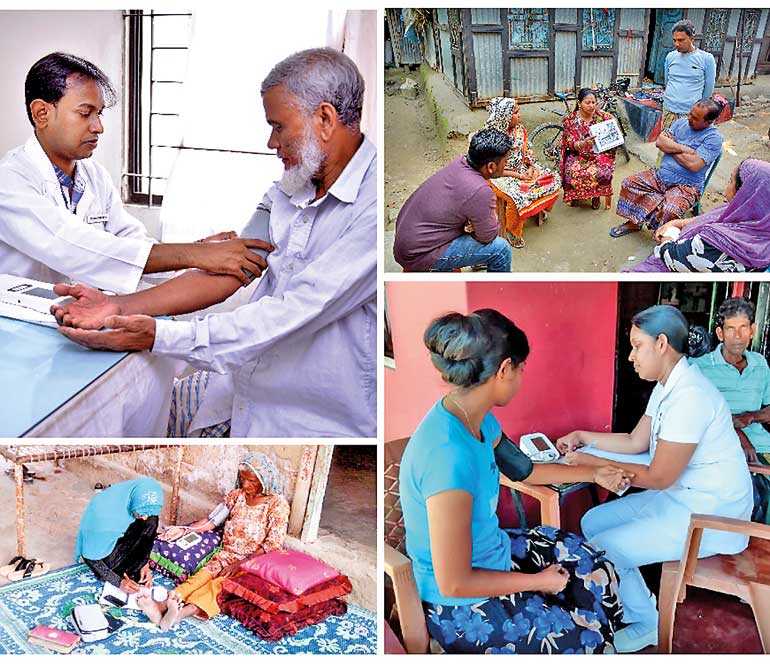Tuesday Feb 24, 2026
Tuesday Feb 24, 2026
Wednesday, 26 February 2020 00:00 - - {{hitsCtrl.values.hits}}

(Top left): A government doctor evaluates a hypertensive patient at the Upazila Health Complex in rural Bangladesh. (Bottom left): A government healthcare worker measures blood pressure at the home of a patient with hypertension in rural Pakistan. (Top right): Community healthcare workers deliver home health education at the home of a patient with hypertension in rural Bangladesh. (Bottom right): A public health midwife measures blood pressure at the home of a patient with hypertension in rural Sri Lanka
A multi-country clinical trial conducted in Sri Lanka, Bangladesh and Pakistan by an international research collaboration involving researchers in Duke-NUS Medical School, Singapore, Faculty of Medicine, University of Kelaniya, Sri Lanka and research institutions in Bangladesh and Pakistan are making global headlines for improving blood pressure (BP) management in patients with high blood pressure.
With the trial leading to ‘clinically meaningful’ reductions in blood pressure and better blood pressure control in patients who received a multi-component intervention in addition to standard medication, researchers are calling for a national scale-up of the intervention used in this study.
The international research collaboration was led by Professor Tazeen H. Jafar from the Health Services and Systems Research Programme at Duke-NUS Medical School, Singapore, and included a team of clinical researchers headed by Prof. Asita de Silva from the Clinical Trials Unit at the University of Kelaniya. According to Prof. Jafar, this research has found that a low-cost, multi-component intervention comprising home visits by community healthcare workers to monitor blood pressure (BP) and to provide lifestyle coaching, coupled with physician training and coordination with the available public healthcare infrastructure in each country, leads to clinically meaningful reductions in BP as well better BP control.
A leading cause of death globally, uncontrolled high blood pressure is a major risk factor for cardiovascular and kidney diseases. In rural parts of low- and middle-income countries like Sri Lanka, where health systems are suboptimal, one in four adults suffers from hypertension – 70% of which is uncontrolled – leading to some of the highest death rates from cardiovascular and kidney diseases.
The landmark study published in the prestigious ‘New England Journal of Medicine’ on 20 February (N Engl J Med; 382: 717-26. DOI:10.1056/NEJMoa1911965), found the decline in mean systolic BP was 5 mmHg greater at the end of two years in the group that received the multi-component intervention (intervention group) compared to the control group, which received only usual care. Reduction in mean diastolic BP as well as overall BP control (<140/90 mmHg) was also better in the intervention group.
Prof. Asita de Silva of the Faculty of Medicine, University of Kelaniya, the study’s principal investigator in Sri Lanka and a co-author of the research paper, said, “Despite having access to effective medicines free of charge through state healthcare institutions, only about 25% of those treated for high BP in Sri Lanka achieve satisfactory control. Traditional approaches to health service delivery, reliant on people presenting to clinics, are clearly not good enough. Instead, innovative models of cardiovascular disease care must incorporate primary healthcare strategies that enhance reach to underserved populations. The clinical trial we conducted over three years has demonstrated that a low-cost community-level intervention delivered by our dedicated community health workers can significantly improve BP control.”
The study is funded by the Joint Global Health Trials scheme, which includes the Medical Research Council, the UK Department for International Development (DFID), the National Institute for Health Research (NIHR), and the Wellcome Trust.
This is the first multi-country trial of its kind and, as such, serves as a model of South-South collaboration. While there are differences in the health systems and some population characteristics in the countries involved, BP control rates are uniformly poor in all of them. Nonetheless, the study found that similar results were achieved in all three countries with the standardised strategies, suggesting that the intervention has validity in different settings.
“A sustained 5 mmHg reduction in systolic BP at community level is known to translate into about a 30% reduction in death and disability from cardiovascular disease,” observed Prof. de Silva. This landmark study demonstrates that community health workers, in our case Public Health Midwives, who play a vital role in the successful community-level delivery of maternal and child healthcare in our country can have an equally important role in managing hypertension at the community level,” Prof. de Silva concluded.
Commenting on the findings of the study an editorial in the same issue of the New England Journal of Medicine recommends population-based prevention through improved diets and lifestyle and enhanced routine screening of blood pressure along with improved availability and initiation of validated drug classes ‘to reduce the dreadful health burden caused by raised blood pressure’.
(Credits: ICDDR, Bangladesh (Nantu Chakma and Dr. Aliya Naheed); Aga Khan University, Pakistan (Dr. Sahar Siddiqui and Dr. Imtiaz Jehan); and University of Kelaniya, Sri Lanka (Dr. Chamini Kanatiwela-de Silva and Prof. Asita de Silva.)